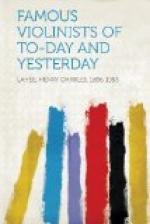Not content with Europe as a field for conquest, he visited America in 1844, and again in 1857 and in 1870.
He was offered many excellent positions, some of which he held for a time and others he declined. In 1845 he married Josephine Eder, an eminent pianist of Vienna, and shortly after was appointed solo violinist to the Emperor of Russia, relinquishing that post six years later in order to travel again. He was professor at the Brussels conservatoire from 1871 to 1873, and in 1872 he was elected a member of the Academic Royale of Belgium, on which occasion he read a memoir of Etienne Jean Soubre.
In 1868 he suffered a double bereavement through the deaths, first of his father, and a short time later of his wife, and, to divert his mind from these troubles, he undertook a tour which lasted three years. During 1873 his active career was cut short by a stroke of paralysis which disabled his left side. He now travelled for health’s sake, and went to Algiers, where he lived quietly for several years. His life was brought to an end by a drunken Arab, who threw a large stone at him while he was riding in his carriage one day, striking him on the head.
As a violinist Vieuxtemps possessed a wonderful staccato, both on the up and down bow. His intonation was perfect. He was fond of strong dramatic accents and contrasts. As a composer for the violin he had wider success than any one since Spohr, but while some of his works contain really fine ideas worked out with much skill, others are merely show pieces of no particular value.
As a man Vieuxtemps had a gay and restless disposition. He was not easily depressed by trifles, and he enjoyed the freedom of a life of constant change and travel, and it was during his travels that most of his best compositions were written.
During the last few years of his active life, after his paralytic stroke had prevented his playing, he suffered much from his inability to demonstrate to his pupils the way in which certain passages should be played. Frequent outbursts of rage ensued, of which his pupils were obliged to bear the brunt, even to being prodded with his iron-shod stick. Sometimes scenes more amusing would occur, as when some grandees would visit the class, and Vieuxtemps would change his manner from smiles and affability while addressing them, to scowls and grimaces while talking to his pupils, the latter, of course, being invisible to the visitors.
When Vieuxtemps visited America in 1857, he was associated with Thalberg, the pianist, and together they visited many towns and cities. Amongst the gems of American newspaper criticism they no doubt took with them several copies of the following, which appeared in the local paper of a town in Tennessee, and was headed “Thalberg and Vieuxtemps:”




